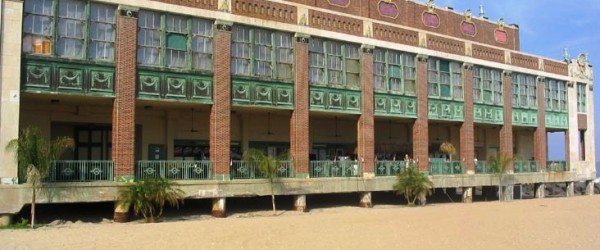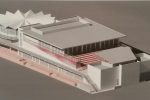Convention Hall sprinkler cost has dropped by hundreds of thousands, Reidy says
Regardless of cost, Madison Marquette says parking issues must be resolved
The estimated cost of installing a sprinkler system in Convention Hall has been reduced dramatically, city manager Terence Reidy said at last night’s council meeting — but Madison Marquette officials are quick to point out that they still will not install the sprinklers unless they feel the expense is justified.
Originally, Madison Marquette officials said sprinklers would cost more than $1 million to install throughout the complex. The scope of the project has since been narrowed, and the cost is now in the hundreds of thousands of dollars, said Madison Marquette executive vice president Anselm Fusco today.
“It’s still not a question of the [availability of] money to pay for sprinklers,” Fusco said today. “It’s a question of justifying the investment.”
Fusco declined to disclose the exact cost estimates. He noted the estimate is “certainly less” than it was before, but that the project would still cost “hundreds of thousands of dollars.”
For the investment to be justified, the issue of who will control three parking lots in the waterfront redevelopment area must be resolved, Fusco said. City manager Terence Reidy and iStar Financial vice president of land Brian Cheripka have said negotiations are progressing on the lots, while Fusco today was not as optimistic.
“Unfortunately, we don’t seem to be making much progress on the critical issue of parking,” he said. “I’m not sure how much progress we’re making.”
Without control of the three lots, Madison Marquette officials have said they may need to scale back redevelopment on the boardwalk — and this could include a decrease in Convention Hall’s offerings.
Officials from Madison Marquette are speaking with the Economic Development Authority [EDA] about loans and grants for the boardwalk businesses and possibly the sprinkler system if Madison Marquette decides taking a loan out is prudent.
If the redeveloper has not taken preliminary steps to install the system by May 1, Convention Hall may be decommissioned.
“If we and the city come to an understanding, we certainly have no intention of closing the building unnecessarily,” Fusco said.
The price also dropped because city officials and Madison Marquette have been working to find less expensive ways to install the sprinklers and a pump system, Reidy said today.
“We saved at least a couple hundred thousand dollars on the pump and found ways to dramatically reduce the cost of the sprinkler system,” he said. “We have spent thousands of hours in the last six years dealing with this issue. I can honestly say there’s been a full-court press on the part of the city to assist Madison Marquette to solve this.”
City employees in the construction, fire and code enforcement departments have been involved, Reidy said.
MAYOR JOHNSON’S TAKE
Asbury Park Mayor Ed Johnson spoke at length about the issue at last night’s council meeting. For him, the issue boils down to two crucial points — “safety and keeping our word,” he said.
“I look at this and I see a safety issue here that upsets me,” he said. “I hear a lot of talk about this and that, and parking, and all these other issues. I want someone to say this has to be about the safety of our employees … our business retail partners and … the people who pass through that building.”
It is also important that the parties involved do what they said they were going to do, he said. He also suggested that those arguing “do some soul-searching.”
“We just survived the greatest super-storm that most of us will probably ever see in our lifetimes,” he said, adding that people have lost their lives, homes and businesses. “And this is what we’re arguing about?”
THE ORIGINAL AGREEMENT
Some residents and city officials take issue with the fact that Madison Marquette did not adhere to the state requirement to install the sprinklers, while others asked Reidy why the city had not forced Madison Marquette’s hand in the installation.
Reidy asked city attorney Fred Raffetto to explain the timeline of events, which began in 2007 when the state amended fire codes in response to a deadly Rhode Island night club fire. Convention Hall was required to install the sprinklers throughout its premises as a result of those changes, Raffetto said.
The city issued a notice of violation in connection with Madison Marquette’s failure to begin installing the sprinklers on March 29, 2007, Raffetto said. Madison Marquette disputed the violation, and the parties entered into a variance in December 2007.
Madison Marquette agreed to take certain actions as a result of that variance, which included the presence of firefighters — paid for by Madison Marquette — at large events.
Sprinkler installation was supposed to be completed by Dec. 1, 2011, Raffetto said. After installation was not completed, the city issued an order requiring payment of a $10,000 penalty, with additional penalties of $1,000 per day that the sprinklers were not installed, he said.
Madison Marquette appealed the penalty, which led to the issuance of a consent order on Sept. 20, 2012, Raffetto said. This consent order provided for certain benchmarks and timeframes within which the sprinkler system was to be installed. The first requirement was for plans for installation to be submitted within four months, by Jan. 20 of this year, Raffetto said.
That date was extended to March 21 because of the damage incurred on the boardwalk from Hurricane Sandy, Raffetto said. Then, the city allowed a further extension to May 1. After the May 1 deadline, benchmarks toward installation must be met every two weeks, Raffetto said.
“The truth of the matter is the city and Madison Marquette had an agreement and that agreement hasn’t been adhered to by Madison Marquette to date,” Reidy said. “We’ve been working with Madison Marquette to make sure the life safety issues are addressed in Convention Hall.”
CONVENTION HALL PROGRAMMING
City resident Werner Baumgartner said during public comment that Madison Marquette should take a “multi-faceted approach” to the use of Convention Hall. He suggested the redeveloper use the facilities for trade shows, special interest groups, opera performances, orchestral performances and other programs that Convention Hall was built to house.
“It needs to be better utilized for everybody to benefit,” he said.
Fusco said after the meeting that the redeveloper has done its best to offer unique, interesting and varied programs at the complex.
“We spend a tremendous amount of time trying to bring in a really diverse group of events,” he said. “We absolutely have been open to anybody who wants to come in, and a lot of the times we have worked with people who frankly have no financial resources to be in there.”
Madison Marquette is owed money by some of the groups that have used Convention Hall, he said.
“The issue of programming Convention Hall in a rich and diverse way has been a prioty for us,” he said. “It’s a lot harder than people think it is.”
BOARDWALK BUSINESSES
Boardwalk business owners attended the meeting to ask what Convention Hall’s status was and to implore the city and the redeveloper to find a way to keep it open.
Gene Mignola owns Shelter Home, which has a downtown location at 704 Cookman Ave. and a satellite shop inside Convention Hall during the summer. He has been keeping up with developments in the Convention Hall controversy, he said.
Those involved in negotiations “continue to collect paychecks,” he said. “Not everyone in Asbury Park is so lucky. We have laid off four employees and I know many businesses have laid off many more … The residents, business owners and employees deserve to have these issues resolved.”
Madison Marquette has also laid off some employees, Fusco confirmed last week. He declined to say how many lost their jobs, and said that Madison Marquette is currently “in the process of reconfiguring our office to be more consistent with our strategy going forward.”
Mignola suggested the city and Madison Marquette employ a third-party mediator before summer comes.
“This is rumored to be the summer for Asbury Park,” he said. “The eyes of the state and the nation that watched Anderson Cooper reporting from our boardwalk [during Hurricane Sandy] will be upon us.”
He acknowledged that Madison Marquette has said Convention Hall is a loss leader, but said the landmark attracts people to the city. Closing Convention Hall could “send the message that the city can’t keep things together,” he said. “It’s a blow to the morale of visitors to Asbury Park. You owe it to us to get this fixed.”
Marilyn Schlossbach owns Langosta Lounge, Pop’s Garage, Lightly Salted, Asbury Park Yacht Club, Kula Café and Dauphin Grille in Asbury Park, as well as a handful of other restaurants elsewhere in Monmouth County and Labrador Lounge in Normandy Beach.
Her boardwalk businesses and Labrador Lounge have yet to reopen, after having sustained heavy damage in Hurricane Sandy.
“I am a Sandy victim multiple times over and struggling to get my businesses open,” she said at last night’s meeting. “I’m concerned about how my city is going to help me.”
Schlossbach has done her share of community service in the city, initiating movie nights on the beach, a farmer’s market, surf classes for the Boys and Girls Club and community gardens in the city, she said. She also spearheaded the creation of the Kula Café, a restaurant in the Springwood Center where young city residents are trained in hospitality and the restaurant business.
“I want you to envision a weekend without boardwalk businesses or Madison Marquette and what that would look like for our homeowners, businesses and all the people we employ,” she said.
Greg Laplaca, owner of Laplaca Pottery on the boardwalk, also urged the city to find a solution.
“This is a very important time for business owners,” he said. “We’re trying to get back up and running and every extra day of bad press is another nail in our coffin.”















